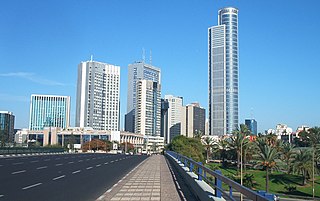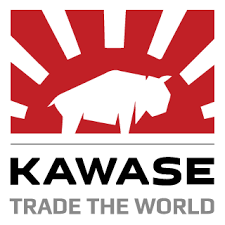In finance, a derivative is a contract that derives its value from the performance of an underlying entity. This underlying entity can be an asset, index, currency, or interest rate, and is often simply called the underlying. Derivatives can be used for a number of purposes, including insuring against price movements (hedging), increasing exposure to price movements for speculation, or getting access to otherwise hard-to-trade assets or markets.

The Commodity Futures Trading Commission (CFTC) is an independent agency of the US government created in 1974 that regulates the U.S. derivatives markets, which includes futures, swaps, and certain kinds of options.
A binary option is a financial exotic option in which the payoff is either some fixed monetary amount or nothing at all. The two main types of binary options are the cash-or-nothing binary option and the asset-or-nothing binary option. The former pays some fixed amount of cash if the option expires in-the-money while the latter pays the value of the underlying security. They are also called all-or-nothing options, digital options, and fixed return options (FROs).
In finance, a contract for difference (CFD) is a financial agreement between two parties, commonly referred to as the "buyer" and the "seller." The contract stipulates that the buyer will pay the seller the difference between the current value of an asset and its value at the time the contract was initiated. If the asset's price increases from the opening to the closing of the contract, the seller compensates the buyer for the increase, which constitutes the buyer's profit. Conversely, if the asset's price decreases, the buyer compensates the seller, resulting in a profit for the seller.
Foreign exchange fraud is any trading scheme used to defraud traders by convincing them that they can expect to gain a high profit by trading in the foreign exchange market. Currency trading became a common form of fraud in early 2008, according to Michael Dunn of the U.S. Commodity Futures Trading Commission.

Options Clearing Corporation (OCC) is a United States clearing house based in Chicago. It specializes in equity derivatives clearing, providing central counterparty (CCP) clearing and settlement services to 16 exchanges. It was started by Wayne Luthringshausen and carried on by Michael Cahill. Its instruments include options, financial and commodity futures, security futures, and securities lending transactions.

CME Group Inc. is a financial services company. Headquartered in Chicago, the company operates financial derivatives exchanges including the Chicago Mercantile Exchange, Chicago Board of Trade, New York Mercantile Exchange, and The Commodity Exchange. The company also owns 27% of S&P Dow Jones Indices. It is the world's largest operator of financial derivatives exchanges. Its exchanges are platforms for trading in agricultural products, currencies, energy, interest rates, metals, futures contracts, options, stock indexes, and cryptocurrencies futures.
MF Global, formerly known as ManFinancial, was a major global financial derivatives broker, or commodities brokerage firm that went bankrupt in 2011. MF Global provided exchange-traded derivatives, such as futures and options as well as over-the-counter products such as contracts for difference (CFDs), foreign exchange and spread betting. MF Global Inc., its broker-dealer subsidiary, was a primary dealer in United States Treasury securities. A series of perceived liquidity problems and large fines and penalties dogged MF Global starting in 2008, and led to its bankruptcy in 2011.

The May 6, 2010, flash crash, also known as the crash of 2:45 or simply the flash crash, was a United States trillion-dollar flash crash which started at 2:32 p.m. EDT and lasted for approximately 36 minutes.
FXCM, also known as Forex Capital Markets, is a retail foreign exchange broker for trading on the foreign exchange market. FXCM allows people to speculate on the foreign exchange market and provides trading in contract for difference (CFDs) on major indices and commodities such as gold and crude oil. It is based in London.

The Cyprus Securities and Exchange Commission, better known as CySEC, is the financial regulatory agency of Cyprus. As an EU member state, CySEC's financial regulations and operations comply with the European MiFID financial harmonization law.
Foreign exchange regulation is a form of financial regulation specifically aimed at the Forex market that is decentralized and operates with no central exchange or clearing house. Due to its decentralized and global nature, the foreign exchange market has been more prone to foreign exchange fraud and has been less regulated than other financial markets.

Plus500 is an Israeli-founded London-based firm that provides online trading services in contracts for difference (CFDs), share dealing, futures trading and options on futures. The company has subsidiaries in the UK, Cyprus, Australia, Israel, Seychelles, Singapore, Bulgaria, Estonia, the United States, Dubai, Indonesia, the Bahamas and Japan. It is listed on the London Stock Exchange and is a constituent of the FTSE 250 Index.

SpotOption was a privately held platform software provider based in Israel in the controversial binary option industry, which was banned in Israel starting in January 2018. The firm announced that it has left the binary options business and is exploring other possibilities. It had previously announced a downsizing of its operations in Israel and moving many functions to other locations. The firm claimed to have 70 percent share in the market for binary options platforms, and charged binary options firms up to 12.5% of their revenues.

Fondex Global is a Cyprus registered online brokerage that provides financial trading in contracts for difference (CFD) on the currency markets, shares, ETFs, major indices and commodities such as precious metals; gold and crude oil.
Gemini Trust Company, LLC (Gemini) is an American cryptocurrency exchange and custodian bank. It was founded in 2014 by Cameron and Tyler Winklevoss.

Securities market participants in the United States include corporations and governments issuing securities, persons and corporations buying and selling a security, the broker-dealers and exchanges which facilitate such trading, banks which safe keep assets, and regulators who monitor the markets' activities. Investors buy and sell through broker-dealers and have their assets retained by either their executing broker-dealer, a custodian bank or a prime broker. These transactions take place in the environment of equity and equity options exchanges, regulated by the U.S. Securities and Exchange Commission (SEC), or derivative exchanges, regulated by the Commodity Futures Trading Commission (CFTC). For transactions involving stocks and bonds, transfer agents assure that the ownership in each transaction is properly assigned to and held on behalf of each investor.

Citadel Securities LLC is an American market making firm providing liquidity and trade execution to retail and institutional clients, headquartered in Miami. The firm also trades futures, equities, credit, options, currencies, and Treasury bonds. It is the largest designated market maker on the New York Stock Exchange.
Crypto.com is a cryptocurrency exchange company based in Singapore that offers various financial services, including an app, exchange, and noncustodial DeFi wallet, NFT marketplace, and direct payment service in cryptocurrency. As of June 2023, the company reportedly had 100 million customers and 4,000 employees.

Miami International Holdings, Inc. (MIH), trading as MIAX, is an American company formed in 2007 that operates global financial exchanges and execution services.











